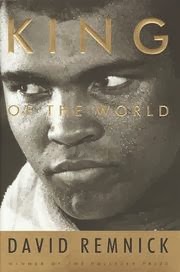Cassius entered the ring in Miami Beach wearing a sort white robe, "The Lip" stitched on the back.
He was beautiful again. He was fast, sleek, and twenty-two. But, for the first and last time in his life, he was afraid.
Description:
I am not a boxing fan, but the figure of Cassius Clay/Muhammad Ali and the radically-changing era in which he lived is well worth reading about. And David Remnick delivers a lively, in-depth, often sad picture of both the man and his world in his King of the World: Muhammad Ali and the Rise of an American Hero.
Remnick focuses on the early years of 1960 - 1965 when Ali first burst onto the boxing scene as the Olympic gold medal winner, and then moves through his heavyweight championship bouts with Sonny Liston and Floyd Patterson. His history concludes just as Ali decides to serve five years in jail rather than fight in Vietnam. An Epilogue brings Ali and all other characters up to date as of the late 1990s.
Cassius Clay was internationally famous at 18 after winning the US gold medal in the 1960 Olympics in Rome, but at the time boxing promoters considered him to be just a light-hitting kid and were unwilling to promote a match for him with a contender like Liston or Patterson.
So Clay creates a new persona as a loud-mouthed, insulting, self-promoting braggart to gain public attention for himself. He begins to taunt Liston unceasingly to rile him, posturing, ranting, and insulting the reigning champion. To the boxing world, this is unacceptable behavior from a newcomer. Liston, his pride and manhood at stake, finally agrees to a title fight, fully confident of victory over this punk, but it is Cassius Clay who is victorious.
Immediately, the new champion declares to the world his conversion to the Nation of Islam and his new name, a polarizing revelation to the public facing racial tensions and riots throughout the country. Immediately, Ali becomes a hated figure, someone not worthy of the heavyweight title.
But this book is more than a biography of Ali. It shows the history and the people of the boxing world in the 1960s. Remnick, through interviews, articles, and other transcripts, brings to light the major people and influences, both good and bad, that shaped Ali's life. Sonny Liston, Floyd Patterson, Jack Johnson, Joe Louis, and even Mike Tyson are given thorough treatments, depicting their personal lives, ambitions, and failures with episodes often narrated in their own painful words.
Remnick also portrays the rise of Elijah Muhammad and his Nation of Islam at this time, as well as Malcolm X and his Black Panthers spin-off movement. Under the influence of Malcolm X and Elijah Muhammad, Ali became more than just a good boxer; he became an aware and radicalized Black man.
While this is Ali's story, Remnick also carefully describes the fighters he faced. Sonny Liston and Floyd Patterson, the reigning champions, are portrayed in detail, contrasting Liston's illiterate, criminal, brutal appearance with Patterson, the docile, passive, more "acceptable" Negro to white fans.
The book also offers a shocking insider look into the organization behind boxing. Historically, boxing had always been under the total control of the Mob and a few powerful White men who put boxers under contract, arranged fights (and sometimes controlled the outcomes), then took all the money for themselves, giving only pocket change to the boxers. It is Ali who breaks this dependence of boxers to the Mob by placing himself under the control of the Nation of Islam, an equally powerful, dangerous group.
The book soars in its details. There are fantastic front row descriptions of Ali's fights with Liston, Patterson, and others. The training, threats from Muslims and mobsters, the front-row celebrities like Sinatra and Elizabeth Taylor, the boxing reporters, the Phantom punch that stopped Patterson in the first round (fix or genuine?), the beatings of Liston... all are described in detail. Readers experience the hoopla that leads up to individual fight, the battles themselves, the thoughts of participants, and the repercussions. Remnick even includes interviews with opponents which show their interpretation of their fights with Ali, their overwhelming desire for victory, and their devastating sadness after a loss.
The Epilogue in King of the World brings readers to the present day with very brief references to Ali's prison sentencing; his later bouts with Frazier, Foreman, Norton, Shavers, Holmes, and Spinks; Ali's Parkinson's Disease; and his acceptance as the international figure holding the Olympic torch in 1996 in Atlanta. Remnick also brings us up to date with the tragic lives of Liston, Patterson, as well as Mike Tyson talking about his similarities and respect for the tragic Sonny Liston.
It is an era of upheaval between Whites and Blacks, between Hawks and Doves, and the mobster and the boxing world. Remnick weaves these people and social elements together into a compelling snapshot of this time. Even Floyd Patterson, once battered by Ali in a title fight, in later life came to understand this man, this heavyweight champion, and his unique impact on his era. Patterson remarked,
"I came to love Ali...I came to see that I was a fighter and he was history."For boxing fans and those who hate fighting but are interested in the forces and people who create an utterly unique era, King of the World is highly recommended.
If this book interests you, be sure to check out:
Brunt, Stephen. Facing Ali: 15 Fighters / 15 Stories
Interviews with 15 fighters who faced Muhammad Ali, including Frazier, Norton, Foreman, Wepner, Shavers, and Holmes.
